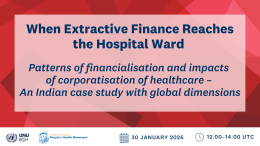On 28 November, FAST hosted its Annual Stakeholder Convening in Amsterdam. Its focus was the alignment of environmental, social, and governance (ESG) standards in financial sector actions to end modern slavery. The event highlighted the importance of considering how ESG outcomes affect risks related to slavery when applying financial levers, thereby ensuring that capital aligns with standards.
Participants acknowledged the significance of building partnerships and collaborating across sectors to effectively tackle slavery and noted the necessity of full involvement by governments, civil society organizations, academia, and the private sector to achieve SDG target 8.7.
Expert panelists identified key priorities, including strengthening ESG frameworks and regulation, enhancing data collection and transparency, and promoting collaboration among stakeholders. By examining the likely future of ESG compliance standards and their implications for combating slavery, the event highlighted how considering ESG factors can play a role in preventing and addressing slavery.
The participants underscored the need for measures within the financial sector to address social risks in tandem with environmental risks to end modern slavery. Survivor inclusion and the insights of communities affected by climate change were emphasized as necessary to shape effective policies and practices.
Sessions at the Convening included:
The Future ESG Landscape: Implications for Combating Slavery. This opening session explored the implications of ESG principles for combating modern slavery, setting the stage for discussions on the role of ESG in addressing this pervasive issue.
Capitalizing on Change: Investors Addressing Modern Slavery. This session focused on the role of investors in addressing modern slavery and how they can leverage ESG principles to drive change within their investment decisions.
How Can ESG Help Prevent Modern Slavery? This session examined the specific ways in which ESG principles can be utilized to prevent modern slavery, emphasizing the importance of engagement with communities with lived experience of vulnerability to make meaningful progress.
Regulating the Financial Sector and Joining Forces: Anti Trafficking Governance by and through Partnerships. This session highlighted some different types of partnerships (public-public, public-private, and regional) that can accelerate anti-slavery progress.
From Soft Law to Hard Law: Challenges and Opportunities in Regulating the Financial Sector. This session considered recent and emerging mandatory human rights due diligence laws as well as ESG investment laws that oblige financial sector actors to conduct human rights due diligence and/or disclose modern slavery risks, impacts and actions to address these issues.
In conclusion, the convening recommended a multifaceted approach to combatting modern slavery effectively within the financial sector, including regulatory oversight measures, investor accountability efforts, survivor involvement, and cross-sectoral collaboration.



